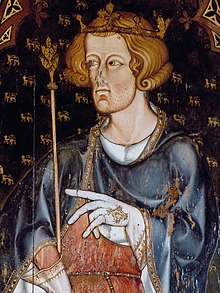
Back Eduard I van Engeland Afrikaans Eduard I. (England) ALS Ēadweard I Engla Cyning ANG إدوارد الأول ملك إنجلترا Arabic ادوارد الاول ملك انجلترا ARZ Eduardu I d'Inglaterra AST I Eduard Azerbaijani بیرینجی ادوارد AZB Эдуард I Byelorussian Едуард I Bulgarian
| Edward I | |
|---|---|
 Portrait in Westminster Abbey likely depicting Edward I, installed sometime during his reign | |
| King of England | |
| Reign | 20 November 1272 – 7 July 1307 |
| Coronation | 19 August 1274 |
| Predecessor | Henry III |
| Successor | Edward II |
| Born | 17/18 June 1239 Palace of Westminster, London, England |
| Died | 7 July 1307 (aged 68) Burgh by Sands, Cumberland, England |
| Burial | 27 October 1307 Westminster Abbey, London |
| Spouses | |
| Issue Detail | |
| House | Plantagenet |
| Father | Henry III, King of England |
| Mother | Eleanor of Provence |
Edward I[a] (17/18 June 1239 – 7 July 1307), also known as Edward Longshanks and the Hammer of the Scots, was King of England from 1272 to 1307. Concurrently, he was Lord of Ireland, and from 1254 to 1306 he ruled Gascony as Duke of Aquitaine in his capacity as a vassal of the French king. Before his accession to the throne, he was commonly referred to as the Lord Edward. The eldest son of Henry III, Edward was involved from an early age in the political intrigues of his father's reign. In 1259, he briefly sided with a baronial reform movement, supporting the Provisions of Oxford. After reconciliation with his father, he remained loyal throughout the subsequent armed conflict, known as the Second Barons' War. After the Battle of Lewes, Edward was held hostage by the rebellious barons, but escaped after a few months and defeated the baronial leader Simon de Montfort at the Battle of Evesham in 1265. Within two years, the rebellion was extinguished and, with England pacified, Edward left to join the Ninth Crusade to the Holy Land in 1270. He was on his way home in 1272 when he was informed of his father's death. Making a slow return, he reached England in 1274 and was crowned at Westminster Abbey.
Edward spent much of his reign reforming royal administration and common law. Through an extensive legal inquiry, he investigated the tenure of several feudal liberties. The law was reformed through a series of statutes regulating criminal and property law, but the King's attention was increasingly drawn towards military affairs. After suppressing a minor conflict in Wales in 1276–77, Edward responded to a second one in 1282–83 by conquering Wales. He then established English rule, built castles and towns in the countryside and settled them with English people. After the death of the heir to the Scottish throne, Edward was invited to arbitrate a succession dispute. He claimed feudal suzerainty over Scotland and invaded the country, and the ensuing First Scottish War of Independence continued after his death. Simultaneously, Edward found himself at war with France (a Scottish ally) after King Philip IV confiscated the Duchy of Gascony. The duchy was eventually recovered but the conflict relieved English military pressure against Scotland. By the mid-1290s, extensive military campaigns required high levels of taxation and this met with both lay and ecclesiastical opposition. When the King died in 1307, he left to his son Edward II a war with Scotland and other financial and political burdens.
Edward's temperamental nature and height (6'2") made him an intimidating figure. He often instilled fear in his contemporaries, although he held the respect of his subjects for the way he embodied the medieval ideal of kingship as a soldier, an administrator and a man of faith. Modern historians are divided in their assessment of Edward; some have praised him for his contribution to the law and administration, but others have criticised his uncompromising attitude towards his nobility. Edward is credited with many accomplishments, including restoring royal authority after the reign of Henry III and establishing Parliament as a permanent institution, which allowed for a functional system for raising taxes and reforming the law through statutes. At the same time, he is also often condemned for his wars against Scotland and for expelling the Jews from England in 1290.
- ^ Morris 2009, pp. xv–xvi.
- ^ Carpenter 2007, pp. 865–891
Cite error: There are <ref group=lower-alpha> tags or {{efn}} templates on this page, but the references will not show without a {{reflist|group=lower-alpha}} template or {{notelist}} template (see the help page).
© MMXXIII Rich X Search. We shall prevail. All rights reserved. Rich X Search